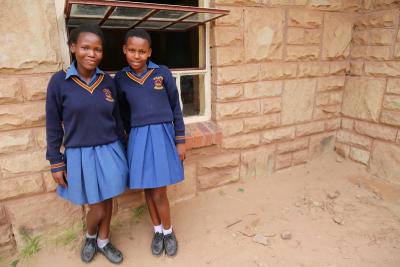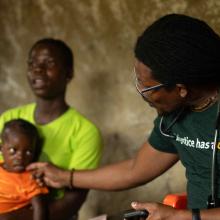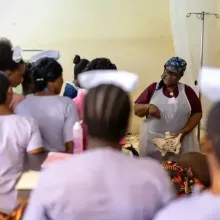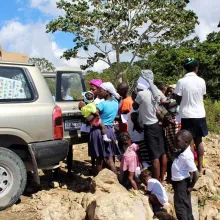Seabata Moeletsi, a mine worker living in southern Lesotho, was diagnosed with multidrug-resistant tuberculosis (MDR-TB) in 2008. Shortly after, he enrolled in Partners In Health (PIH) Lesotho’s MDR-TB program.
Preparing for the worst, Moeletsi asked staff at PIH Lesotho to care for his two youngest children, in the event of his death. After all, he was all they had. His wife had passed years ago due to tuberculosis, leaving behind four kids. Soon after his request for support, he passed away due to complications from MDR-TB.
Keeping their promise, PIH Lesotho’s community health team stepped in to support the family. They enrolled the two youngest children in a new PIH program for orphans and vulnerable children (OVC).
Long-term, comprehensive support
After losing both parents, Mankopane Moeletsi, 6, and her brother Tšoloane Moeletsi, 8, were depressed. Such types of trauma, known as adverse childhood experiences, can impact a child’s health well into their adult years.
Through the OVC program, Mankopane and her brother received mental health support, including therapy sessions. Other support included school fees and supplies, food, clothes, and medical care. For years, they lived in PIH Lesotho’s orphanage, a home dedicated to the OVC program, with three other children, and a foster mother.
During this time, the eldest son was working in South Africa as a citrus fruit harvester, while the second had just turned 18 years old, making him a legal adult.
“My second brother endured the most hardships and pain in life; when we lost our father, he had just turned 18. According to me, he was still very young and in need of some form of support,” Mankopane explains. “It breaks my heart. He stayed at home to fend for himself and made a living by looking after people’s livestock with occasional direction from our late mother’s aunt.”
PIH has worked in Lesotho since 2006, when it was invited by the government to support its response to the HIV epidemic. In the years since, PIH’s programs have expanded, ranging from non-communicable diseases to child health, providing lifesaving care to thousands of people in the southern African nation. In 2007, PIH launched the country’s first treatment, care, and support program for patients with MDR-TB, the drug-resistant form of the common, infectious disease that Mankopane’s father had.
With the support of PIH Lesotho, Mankopane Moeletsi completed elementary school, middle school, and high school.
“If PIH had not been in my life, I would not have gone to school at all,” she says.
Upon graduation, she enrolled in a business and community development program at a vocational school, where she studied environmental science, culinary arts, travel and tourism, and woodworking. Most interested in culinary arts, Mankopane Moeletsi decided to start a small business in her hometown, baking and selling pastries such as cupcakes and fat cakes, a type of deep-fried doughnut. She ran her business for a year before she made her way back to PIH.
“My business seemed quite promising at first and I made some money. But things changed when individuals started taking fat cakes and muffins on credit, and occasionally they didn’t buy them at all, so we ended up eating them. My business gradually began to collapse,” she says.
When she thought everything was falling apart, PIH Lesotho stepped in again.
PIH Lesotho’s community health director contacted Mankopane and other members of the OVC program and urged them to apply for vacant positions.
“What motivated me to apply was the fact that I knew more than anybody else about the benefits of PIH and the prospect of more OVCs like myself receiving support inspired me to apply,” she states.

Relebeletse Masia (left), 14, and Mankopane Moeletsi (right), 12, at boarding school in 2016.
Rebecca E. Rollins / Partners In Health
Full Circle Moment
In July, Mankopane Moeletsi began working at PIH Lesotho as an OVC assistant. In her role, she assists children in the program by gathering and distributing food, clothes, and other essential items. She also supports them with navigating medical care and school.
“Working within this program is very close to my heart because I can now make a difference in other OVC’s lives,” she says. “It’s literally what I wake up for and my greatest wish is for them to lead successful lives.”
Her 10+ years-long connection with PIH, especially in recent months, has inspired her to take her education even further: pursuing a career in health care.
“I enjoy being of service to others and making a noticeable difference in their lives,” she says. “Now that I am part of Partners In Health Lesotho, and I have closely seen the work, I want to continue assisting those in need by studying nursing.”
Since 2009, the OVC program in Lesotho has supported 91 children. All orphans are children of patients who died from HIV or TB, two diseases of which Lesotho faces some of the highest rates in the world. Similar OVC programs exist across other countries where PIH works, including Haiti, Malawi, and Rwanda.



